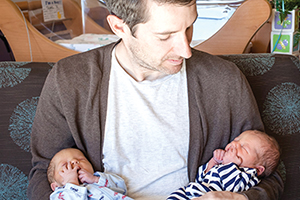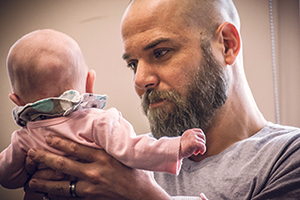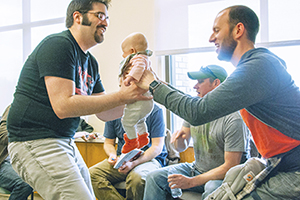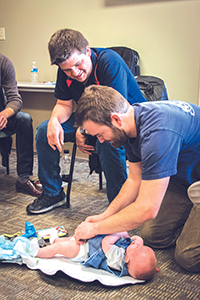By RENEE STOVSKY
![]()

Kelly Magelky with his newborn twins. Rowan is on the left, Flynn on the right.
(
Photo by: Chuck Ault/Saint Joseph Hospital)Kelly Magelky, 36, of Denver, became the father of twin boys, Rowan and Flynn, on April 18.
To prepare for parenthood, he and his wife, Rachel, 31, took a litany of classes — everything from an infant health care program dubbed "Babies, Booties and Baths," to lessons on CPR, breast-feeding and managing multiples.
Attending the lectures, he says, boosted his confidence level to "somewhere above white knuckling." Still, he wasn't sure if he was ready for the huge lifestyle change two babies would bring.
But after a three-hour Saturday morning session at "Boot Camp for New Dads," a program for first-time fathers-to-be at Saint Joseph Hospital in Denver, part of SCL Health, Magelky says he felt up to the challenge, despite anticipating a lot less sleep.
"There's a very interesting energy when you get a bunch of guys together to talk about having kids," he says. "We all had tons of questions, and we bonded together like a support group in a very short period of time. I left feeling like I'd already built a foundation of parenting skills, even before the twins had arrived."
Lighten up
Reached again when his sons were 6 weeks old, Magelky says he appreciates the preparation the boot camp provided even more.
"The class was the best thing that could have happened to me. Everyone had a great attitude — a good sense of humor and a mind-set that you can't take things too seriously," he says. "It helped me manage my expectations appropriately, preparing me for worst case scenarios while reassuring me that I could make it to the other side.
"We've been really lucky; so far the babies are pretty easy. One is like a Labrador — he just likes to eat and cuddle. The other is more like a border collie — very alert, with a weird kind of energy," he says. "But in the middle of the night — when I get frustrated and angry because they won't stop crying — I think about what I learned in class, that it's not their fault, that it won't last forever. That helps me step back and gain some perspective."
![]()

Josh Ernst holds 3-month-old Anneke Cash during a class at Saint Joseph Hospital in Denver to equip first-time
fathers-to-be with practical parenting skills.
(
Photo by: Chuck Ault/Saint Joseph Hospital)Josh Ernst, 37, who welcomed a daughter in March with his wife, Lindsey, 31, attended the same class and gained self-confidence by observing the fathering skills of two "veteran" dads — former boot camp students who brought their months-old infants along for hands-on diapering, feeding and burping practice.
"I got to hold a baby girl, Anneke, on my lap for 20-30 minutes and she was nothing short of adorable," Ernst says. "Her dad was so relaxed, and he had a big smile on his face even when he was telling stories about how things didn't always go according to plan. It was so reassuring that instead of trying to savor every moment alone with my wife before the baby arrived, I couldn't wait to dive right in."
![]()

Ault
Player-coach
That kind of positive feedback is what continues to fuel Chuck Ault's enthusiasm for the program. Ault, manager of community health at Saint Joseph, has been involved with Boot Camp for New Dads since 1997.
That's when Sr. Amy Willcott, SCL, then the hospital's community health manager, first found out about the program, begun by Greg Bishop in 1990 at UC Irvine Medical Center in California, and asked Ault to attend a three-day workshop there to train attendees on starting their own boot camp programs.
"Sr. Amy had been hearing from our nursing staff in obstetrics that new dads were unprepared to live up to their full potential in helping their wives care for their newborns," recalls Ault. "As a Catholic hospital, we are committed to the idea of treating all aspects of a person, and though we were doing a thorough job of preparing mothers for birth, we were falling short with making dads a focal point too."
The program struck an immediate chord with Ault — whose second daughter was born two days before he presided over the first class — as well as with the greater Denver community.

Boot Camp for New Dads alumni Kevin Cash, right, passes his baby Anneke, to a father-to-be during a workshop in February at Saint Joseph Hospital in Denver.
(Photo by: Chuck Ault/Saint Joseph Hospital)
Proactive parenting
Though Saint Joseph was the only hospital there to offer a Boot Camp for New Dads for several years, now virtually every hospital in the area offers a version of it at least once a month. At Saint Joseph, Ault says, it's offered 62 times a year — every weekend as well as a handful of weekday evenings — and reaches about 1,200 new dads a year. Cost is minimal — $35 per session, including a "Crash Course for New Dads" companion manual — and scholarships are available if needed.
"For the first 10 years or so, expectant mothers enrolled their husbands. The dads didn't even know until Saturday morning where they were headed, and many showed up begrudgingly," he recalls. "That dynamic has changed dramatically. Now most guys come based on a recommendation from a friend, brother or boss. There's a critical mass of alums out there, and a whole different attitude about proactive parenting."
Though the basic format of the class hasn't changed over the years, says Ault, the content is often driven by changes in culture.
Typically, hour one focuses on navigating relationship challenges between spouses who have suddenly become moms and dads. Hour two is all about the volunteer "veterans" who return, babies in tow, to talk about their experiences as new fathers and to let expectant dads have hands-on experience with holding, feeding, calming and amusing their kids — as well as changing a diaper or two. And hour three is all about troubleshooting — discussing everything from home safety to day care — and listening and responding to classmates' concerns.
Universal themes
"The class is intended to be a snapshot of the first six months of life with a baby. The essential principle is portraying the role of dad as protector, from helping mom during childbirth to caring for a newborn, managing the household and acting as gatekeeper to reduce the stress of round-the-clock nursing, lack of sleep, visits from well-intended family members and friends, and so on," says Ault.
That said, issues like postpartum depression, paternity leave — even male baby blues — have been added to the curriculum in recent years to reflect modern societal concerns.

With his baby Michael as a model, veteran dad Adam Nord demonstrates his diapering technique before a class of first-time expectant fathers.
(Photo by: Chuck Ault/Saint Joseph Hospital)
"Certain issues seem to be universal among men: Will I be able to afford this baby? Will the nursery be completed before the baby arrives? Will we still be able to travel and go to restaurants? How will our dog adjust?" says Ault. "We try to get the guys focused on things that really matter, instead of being distracted by things that are inconsequential. For example, babies usually sleep in bassinets in their parents' room for a while, so the nursery doesn't have to be finished right away. And initially, at least, babies don't cost that much, so financial adjustments can happen subtly and slowly."
Serious fun
Despite the seriousness of some of the issues discussed in Boot Camp for New Dads the class, says Ault, is "always fun — and funny."
"You can't mix big hairy guys and little cute babies together without humor that almost always centers around some bodily fluid. When someone gets peed on, we always pronounce it the ultimate baptism and welcoming act of fatherhood," he says.
And for the veteran dads, it's a profound affirmation that they have traveled far down a steep learning curve in just a few months.
Adam Nord, 37, who brought his 4-month-old son Michael back to boot camp, says he was struck by the camaraderie of class members. "I found that whatever issue a guy brought up, someone else in the class felt the same way," he says. "And it was very rewarding to watch the reaction of guys who had never held a baby before hold Michael. I think it really helped alleviate their worries."
Kevin Cash, 35, says he had absolutely no experience with babies when he took the class, and was frightened that he wouldn't be a "good enough" dad. Returning with daughter Anneke, 3 months, he "remembered back to the terror" but relished the opportunity to both show her off and give his wife the morning off at the same time. "I'm all about ancillary benefits these days," he laughs.
Joking aside, Ault says longtime members of the hospital's nursing staff insist they can tell the difference between boot camp and non-boot camp dads. "They tell us our graduates are the ones who are proactive, asking how to swaddle their babies and how to give sponge baths, rather than sitting on the sidelines, waiting to be told what to do."
For Ault and other Boot Camp for New Dads instructors, that's positive proof that a little education and a lot of support will empower men to embrace the challenge of fatherhood.
Copyright © 2016 by the Catholic Health Association
of the United States
For reprint permission, contact Betty Crosby or call (314) 253-3477.